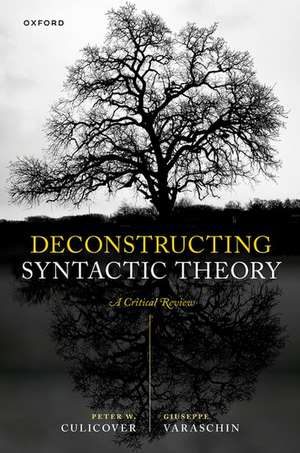Deconstructing Syntactic Theory: A Critical Review
Autor Peter W. Culicover, Giuseppe Varaschinen Limba Engleză Hardback – 10 iun 2025
Preț: 714.57 lei
Preț vechi: 1022.64 lei
-30% Nou
Puncte Express: 1072
Preț estimativ în valută:
136.74€ • 146.21$ • 114.01£
136.74€ • 146.21$ • 114.01£
Carte nepublicată încă
Doresc să fiu notificat când acest titlu va fi disponibil:
Se trimite...
Preluare comenzi: 021 569.72.76
Specificații
ISBN-13: 9780198947783
ISBN-10: 019894778X
Pagini: 400
Dimensiuni: 156 x 234 mm
Editura: OUP OXFORD
Colecția OUP Oxford
Locul publicării:Oxford, United Kingdom
ISBN-10: 019894778X
Pagini: 400
Dimensiuni: 156 x 234 mm
Editura: OUP OXFORD
Colecția OUP Oxford
Locul publicării:Oxford, United Kingdom
Notă biografică
Peter W. Culicover is Distinguished University Professor Emeritus at the Ohio State University, where he was founding Director of the Center for Cognitive Science (1989-2003) and Chair of the Department of Linguistics (1998-2006). His research is concerned primarily with understanding and explaining the syntactic structure of human languages, and he has explored such topics as language learnability, computational modeling of language acquisition and language change, the grammar of focus, grammatical constructions, the grammar of contemporary English, and the architecture of grammar. His many publications with OUP include Grammar and Complexity (2013), Explaining Syntax (2013), and Language Change, Variation, and Universals (2021).Giuseppe Varaschin is a researcher and lecturer in the Department of German Studies and Linguistics at Humboldt-Universität zu Berlin, where he is currently part of the research project "Building register into the architecture of language - an HPSG account". He specializes in syntactic theory and the syntax-semantics interface. His current work explores topics such as syntactic variation, social meaning, sociolinguistic perception, anaphora, agreement, and the architecture of grammar, with a focus on English, German, and Romance languages. He is also interested in developing computer-processable grammar fragments as a way of checking the formal consistency and large-scale empirical adequacy of theoretical proposals.
